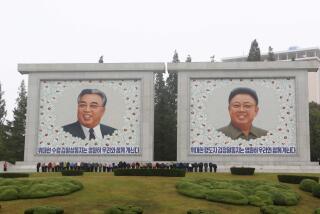No Soviet Reform, No Western Aid : Economics: Treasury Secretary Brady says at Paris meeting that Moscow’s plans lack ‘sufficient precision.’
- Share via
PARIS — The United States cautioned again Tuesday that the Western powers are unlikely to extend massive aid to the Soviet Union this summer unless Moscow comes up with a firm plan--and the political will--to begin converting to a market economy.
In an interview with reporters, Treasury Secretary Nicholas F. Brady said that despite heightened negotiations between the two sides, the Soviets’ plans for economic reforms still lack “sufficient precision to require any answer.”
As a result, he said, it is “hard to see” the United States and its major economic allies announcing any major aid package for the Soviets at the seven-nation economic summit in London in July. “In terms of a ‘grand bargain,’ I think there is work to do.”
Brady’s remarks, which came during a break in the annual ministerial-level meeting here of the 22-nation Organization for Economic Cooperation and Development, echoed similar pessimistic comments late last week by Secretary of State James A. Baker III.
The Administration has been carrying on a two-pronged strategy in regard to the Soviets, with President Bush stressing the opportunities for Moscow to make economic reforms while letting Baker and Brady emphasize how little Moscow has done so far.
So far, the Western powers have proposed relatively little in aid for the Soviets. Bush announced Monday that he would waive the last obstacles to providing most-favored-nation trade status and endorse Soviet membership in the International Monetary Fund.
“The Grand Bargain” is the name that U.S. and Soviet economists have given an informal plan under which the Soviets would undertake drastic economic reform in exchange for massive infusions of $30 billion to $50 billion a year in aid.
In the closed session of the OECD, Brady also pressed for lower interest rates, as he had at April’s meeting of the Group of Seven, which comprises top economic policy-makers from the United States, Japan, Germany, Italy, France, Britain and Canada.
Officials who attended Tuesday’s session said Brady’s appeal seemed much less forceful than it had in April--possibly because he was rebuffed then after Germany and Britain refused to go along.
Brady and some other officials attributed this unexpected lack of conflict to the fact that several countries, including the United States, have reduced their rates in recent weeks.
“There was no real clash among the countries,” European Community Vice President Henning Christophersen said.
As the OECD session opened, U.S. and European officials struggled to get the stalled global trade talks going again, but the effort produced little more than optimistic rhetoric and vows not to fail.
“There is a determination now that success is inevitable. It must be achieved,” said Frans Andriessen, the European Community’s vice president and trade minister.
A high-ranking U.S. trade official said the trading partners agreed to “pick up the pace of some of the consultations which were already in motion.” But he conceded that there is “no sign yet of a full-blown negotiation” to break the impasse over demands by the United States and other agricultural exporters that the Europeans sharply reduce their massive farm-subsidy program.
All sides say they hope for an agreement by year’s end yet insist that there is no firm deadline.
Negotiators for 107 countries had hoped to settle the issue last December, at what was to have been the final session of the ambitious, wide-ranging trade talks known as the Uruguay Round. However, the talks collapsed when neither side refused to budge.
That experience could explain the different tone between last year’s acrimonious OECD session and this two-day session, where the rhetoric has been restrained.
More to Read
Get the L.A. Times Politics newsletter
Deeply reported insights into legislation, politics and policy from Sacramento, Washington and beyond. In your inbox twice per week.
You may occasionally receive promotional content from the Los Angeles Times.








